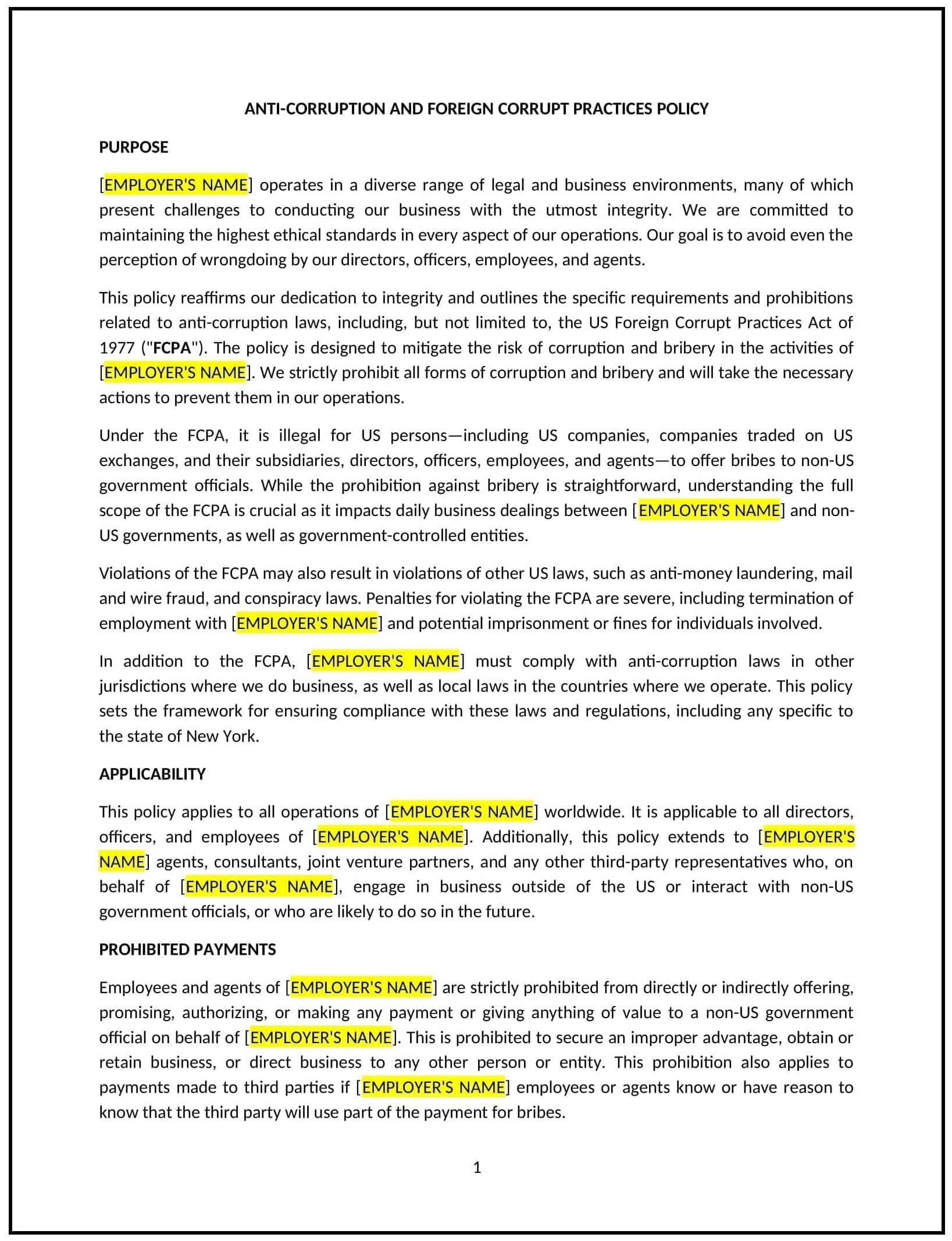Anti-corruption and foreign corrupt practices policy (New York): Free template
Got contracts to review? While you're here for policies, let Cobrief make contract review effortless—start your free review now.

Customize this template for free
Anti-harassment policy (New York)
An anti-harassment policy helps New York businesses maintain a respectful and inclusive workplace by setting clear expectations regarding acceptable behavior and prohibiting harassment in any form. This policy defines harassment, including sexual harassment, racial harassment, and other forms of discrimination, and establishes the procedures for reporting, investigating, and resolving complaints. The policy applies to all employees, contractors, and third parties interacting with the business. It also includes measures to protect employees from retaliation and ensures that any violations are addressed promptly and fairly.
By implementing this policy, businesses can promote a culture of respect, ensure compliance with New York state and federal anti-harassment laws, and reduce the risk of legal liability and reputational harm.
How to use this anti-harassment policy (New York)
- Define harassment: Clearly define what constitutes harassment, including verbal, physical, or visual conduct that creates an intimidating, hostile, or offensive work environment. The policy should cover harassment based on protected characteristics such as race, gender, age, disability, sexual orientation, religion, or any other legally protected class.
- Establish reporting procedures: Specify how employees can report harassment, including the steps for filing a complaint, who to contact, and the confidentiality of the process. The policy should ensure that employees feel safe reporting incidents and that all complaints are taken seriously.
- Ensure no retaliation: Outline the protections in place to ensure that employees who report harassment are not retaliated against. The policy should emphasize that retaliation is strictly prohibited and that any acts of retaliation will be subject to disciplinary action.
- Investigate complaints promptly: Set guidelines for investigating harassment claims, including the steps to take, the timeframe for conducting investigations, and the individuals responsible for handling complaints. The policy should ensure that all complaints are handled impartially and without bias.
- Define consequences for harassment: Specify the range of disciplinary actions for employees found to be engaging in harassment, from counseling and warnings to termination, depending on the severity of the offense. The policy should ensure that consequences are fair and consistent.
- Promote a respectful work environment: Encourage employees to treat each other with dignity and respect and foster a workplace culture where harassment is not tolerated. The policy should include steps for preventing harassment, such as regular training, promoting open communication, and supporting diversity and inclusion initiatives.
- Comply with New York state laws: Ensure that the policy is in compliance with New York state’s specific anti-harassment laws, including those related to workplace discrimination, sexual harassment training requirements, and employee protections.
Benefits of using this anti-harassment policy (New York)
This policy offers several benefits for New York businesses:
- Promotes a respectful workplace: The policy helps establish a culture where all employees feel safe and respected, which improves morale, job satisfaction, and productivity.
- Reduces legal risks: By clearly defining harassment and providing a structured process for reporting and addressing complaints, businesses can reduce the risk of legal liabilities related to harassment claims under New York state and federal laws.
- Increases employee trust: When employees see that their concerns about harassment are taken seriously, it increases trust in management and improves employee relations. The policy encourages transparency and fairness in dealing with workplace issues.
- Enhances compliance with laws: The policy helps businesses comply with both New York state laws and federal regulations, such as Title VII of the Civil Rights Act, which require businesses to address and prevent harassment in the workplace.
- Improves recruitment and retention: A business with a clear and enforceable anti-harassment policy attracts top talent who value a safe and inclusive work environment. It also helps retain employees by demonstrating a commitment to protecting them from harassment.
Tips for using this anti-harassment policy (New York)
- Communicate the policy clearly: Ensure that all employees are aware of the anti-harassment policy and understand the process for reporting harassment. This can be done during onboarding, via employee handbooks, and through regular training sessions.
- Offer regular training: Provide training on recognizing and preventing harassment to all employees, managers, and supervisors. This can include interactive sessions, scenario-based learning, and resources for handling difficult situations.
- Ensure transparency in investigations: When investigating complaints, ensure transparency and fairness in the process. The policy should outline how investigations will be handled, how employees will be kept informed, and how the process will maintain confidentiality.
- Encourage bystander intervention: Promote a workplace culture where employees are encouraged to intervene if they witness harassment, ensuring that the policy extends beyond victims to include all members of the workplace community.
- Review and update the policy regularly: Periodically review the anti-harassment policy to ensure it remains relevant, effective, and compliant with any changes in New York laws. This includes updates to legal requirements and feedback from employees about the policy’s effectiveness.